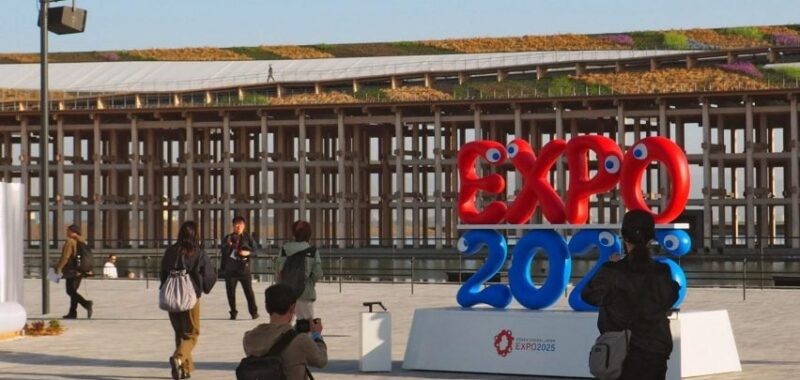
Expo 2025 recently opened in Osaka with pavilions designed by leading architects including Kengo Kuma, Shigeru Ban and Lina Ghotmeh. But what actually is an expo, anyway?
What is an expo?
An expo, short for exposition, is a global event where nations come together to showcase ideas, innovations and inventions. They involve numerous countries constructing pavilions to showcase their homegrown creative talent.
The latest World Expo is currently taking place in Osaka, Japan. It began last month and will run until October.
Is an expo the same as a world’s fair?
Yes. In the past, the events now known as expos were mostly called world’s fairs – and this term is still commonly used in the United States. Around the 1950s, expo became the preferred word.
The events were also known as Exposition Universelle in French, which translates as universal exhibition. They differ from other more specialised exhibitions such as the Exposition internationale des arts décoratifs et industriels modernes, which marked the beginning of the art deco movement.
Who runs and organises these expos?
Since 1928, the Bureau International des Expositions (BIE) has been the international sanctioning body for expos, with 184 member nations. Along with the most high-profile World Expos, the organisation also runs Specialised Expos, Horticultural Expos and the Triennale Milano.
How often do they take place?
In the past, expos, or world’s fairs, took place on an ad-hoc basis, with events taking place almost every two years at the turn of the 20th century. Since 2000, the events have become more ordered, with World Expos now taking place every five years.
How are expos selected?
Expo host cities are determined in a bidding process similar to how Olympic hosts are determined. Candidate cities submit bids, and voting in a secret ballot by BIE members is used to determine the host.
For 2025, alongside Osaka, Baku in Azerbaijan, Yekaterinburg in Russia and Paris in France submitted bids (although Paris later withdrew after its winning bid to host the Olympics).
When and where is the next expo?
The next World Expo is set to place in Riyadh in Saudi Arabia in 2030.
The other cities to submit bids were Rome in Italy and Busan in South Korea, as well as Moscow in Russia and Odesa in Ukraine, both of which withdrew following the Russian invasion of Ukraine in 2022.
What was the first expo?
Although numerous global gatherings similar to world’s fairs took place through history, the BIE states that the first World Expo was the Great Exhibition at the Crystal Palace in London in 1851.
Why are expos architecturally interesting?
To ensure that the expos make a mark, the host city usually commissions several high-profile and impressive structures.
Alongside these core buildings are the national pavilions. As the aim of nations contributing to an expo is to showcase their country, these pavilions are often well-funded and built by leading architects.

What are some of the most famous expo buildings?
Some of the world’s most recognisable buildings have been constructed for World Expos, with the Eiffel Tower, built for the Exposition Universelle of 1889, being the most famous.
Other landmark structures created for expos include the Space Needle in Seattle, Atomium in Brussels and Biosphere in Montreal, while pavilions have been designed by figures such as Le Corbusier, Ludwig Mies van der Rohe, Thomas Heatherwick and Álvaro Siza.
We recently rounded up the 12 all-time most architecturally significant expo buildings.
What are the highlights of Expo 2025?
As in previous editions, there is a lot of high-quality architecture at Expo 2025 Osaka with pavilions designed by leading Japanese architects Kengo Kuma, Shigeru Ban and SANAA.
When the expo opened, we rounded up the 10 must-see pavilions at the event.
All of these buildings were encircled by The Grand Ring, a gridded wooden structure formed using traditional joinery that was designed by Japanese studio Sou Fujimoto Architects.
According to Guinness World Records, this building is the largest wooden architectural structure in the world.
Why are expo controversial?
In recent years expos have been criticised due to the cost of hosting the event and the cost to participants.
The temporary nature of the structures built for the event also leaves expos open for criticism on sustainability grounds.
Others have criticised expos for being used to culture wash. Human Rights Watch criticised the Dubai Expo for glossing over the country’s human rights issues. The organisation’s deputy Middle East director Michael Page described the event as “yet another opportunity for the UAE to falsely present itself on the world stage as open, tolerant, and rights-respecting”.
The main image is by Lizzie Crook.
The post Everything you need to know about expos and world's fairs appeared first on Dezeen.

